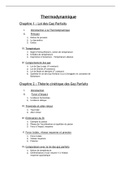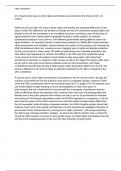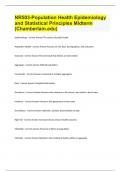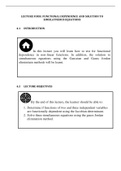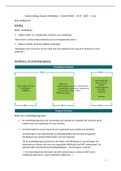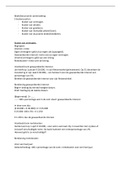Table of Contents
1. Executive Summary......................................................................................................................... 4
Anglo American is a multinational enterprise that operates in South Africa, and its success
and challenges are influenced by both formal and informal institutional frameworks. These
frameworks include political, economic, and legal systems, as well as cultural, linguistic,
religious, and ethical factors. This report will examine how these institutional frameworks
impact Anglo American's operations in South Africa and how the company has struggled to
survive in this complex environment. ................................................................................................ 5
Formal institutional frameworks such as political, economic, and legal systems significantly
impact multinational enterprises like Anglo American (Rugman & Verbeke, 2014). In South
Africa, the political system has been marked by instability and uncertainty, which has made it
difficult for Anglo American to plan and implement their operations. Additionally, the
economic system has been characterized by high levels of inequality and poverty, which
have led to social unrest and protests. ............................................................................................. 5
Furthermore, the legal system in South Africa has been a challenge for Anglo American due
to the complexity and lack of clarity of regulations (Mkhabela,2015). ......................................... 5
On the other hand, informal institutional frameworks such as culture, language, religion, and
ethics also significantly impact Anglo American's operations (Khanna, 2014). .......................... 5
The impact of institutional frameworks on Anglo American's operations in South Africa has
significant management implications. The company must be aware of and adapt to the
political, economic, legal, cultural, linguistic, religious, and ethical factors that influence its
operations. To do so, Anglo American should invest in developing contextual intelligence
(Khanna, 2014) and cultural intelligence (Earley & Ang, 2003) among their managers and
employees. ............................................................................................................................................ 5
1.1
In conclusion, the success, and challenges of Anglo American as a multinational enterprise
operating in South Africa are heavily influenced by both formal and informal institutional
frameworks. These frameworks include political, economic, and legal systems, as well as
culture, language, religion, and ethics. ............................................................................................. 5
2. Literature search .............................................................................................................................. 7
Various sources were consulted to gather the necessary information, such as Open Access
Journals, Sage Journal, Cambridge Core journals, Cochrane Library, Academia, and IEEE
Xplore. Google and Google Scholar were the primary search engines used, and
approximately 350,000 results were returned. Out of the results, 45 articles were selected for
further investigation.............................................................................................................................. 7
3. Background ....................................................................................................................................... 8
Anglo American is a global mining company that has its origins in South Africa. Founded in
1917 by Sir Ernest Oppenheimer, the company started as a gold mining company in South
Africa and gradually expanded its operations to other parts of the world through mergers and
acquisitions (Luo, 2016). Under Oppenheimer's leadership, the company acquired control of
De Beers, the world's leading diamond company, and diversified its operations into other
minerals such as copper, coal, and iron ore. ................................................................................... 8
The company's growth and success are attributed to the leadership of its top executives,
who made strategic decisions to expand the company's operations globally. In the 1990s,
Anglo American shifted its focus from South Africa to other regions such as Latin America,
Australia, and Canada. This move was driven by a desire to diversify its portfolio and reduce
1
,its reliance on the South African market, which was facing political and economic instability
at the time. ............................................................................................................................................. 8
Anglo American's expansion into Africa was motivated by the continent's vast mineral
resources and the potential for growth in emerging markets. The company's operations in
Africa include South Africa, Botswana, Namibia, and Zimbabwe, where it mines diamonds,
platinum, copper, and iron ore. The company's presence in Africa has not been without its
challenges, including political instability, regulatory hurdles, and social unrest. ........................ 9
The company's management has set objectives to address these challenges and ensure the
company's long-term success in Africa. These objectives include investing in sustainability
and social responsibility, developing contextual and cultural intelligence, and supporting local
communities through education and job creation initiatives. ......................................................... 9
4. Formal institutional frameworks ................................................................................................... 10
4.1 Overview ................................................................................................................................... 10
4.2 Evaluation of the determinants of success or failure of an MNE in a formal institution
and key implications for management action of formal Institutions ........................................ 11
4.2.1 Political System ................................................................................................................ 11
4.2.2 Economic System............................................................................................................. 13
5. Informal institutional frameworks ................................................................................................. 14
5.1 Overview ................................................................................................................................... 14
5.2 Evaluation of the determinants of success or failure of an MNE in an informal
institution and key implications for management action of informal ....................................... 15
5.2.1 Culture................................................................................................................................ 15
5.2.2 Language ........................................................................................................................... 16
5.2.3 Religion .............................................................................................................................. 17
5.2.4 Ethics .................................................................................................................................. 17
6. Resource Appraisal ....................................................................................................................... 18
7. Challenges Trading Internationally .......................................................................................... 23
8. Foreign Direct Investment ......................................................................................................... 26
9. Exchange Rates ............................................................................................................................. 31
10. Global, Regional, and Bilateral Economic Integration ........................................................... 35
11. Socially Responsible Business ............................................................................................ 38
12. Conclusions ............................................................................................................................. 41
The authors have applied the institutions and resource-based perspectives to understand
the challenges faced by Multinational Enterprises (MNEs) operating in different locations
(Barney, 1991; North, 1990). They have found that MNEs face challenges such as cultural
differences, regulatory frameworks, and market access, and need to identify key resources
and capabilities that determine their success or failure in different locations (Barney, 1991).
Moreover, they have suggested that MNEs need to evaluate if the location advantages
gained are a good fit for their strategic goals and if institutional constraints and enablers
governing FDI enhance the legitimacy of the MNE in the host country (Dunning, 1993;
Gereffi, Humphrey & Sturgeon, 2005). ........................................................................................... 42
2
,The authors have concluded that the success or failure of MNEs operating in different
locations depends on their ability to find and leverage comparative advantages, conduct
resource appraisals, and evaluate FDI opportunities (Barney, 1991; Dunning, 1993).
Furthermore, they have emphasized that the institutions and resource-based perspectives
offer valuable insights into the challenges faced by MNEs operating in different locations and
that managers of MNEs need to consider these perspectives when making decisions (North,
1990; Barney, 1991). ......................................................................................................................... 42
13. Recommendations ................................................................................................................. 44
14. Bibliography .................................................................................................................................. 46
14. Revisions....................................................................................................................................... 50
Formatted: Font: 12 pt
Formatted: Font: 12 pt
Formatted: Line spacing: 1.5 lines
3
, 1. 1. Executive Summary
Formatted: Font: 12 pt, Not Bold, No underline
In this report, I will be speaking about MNE. They have introduced a new role in local
and globalization, thus, the rising numbers to achieve and strive from emerging
Formatted: Font: 12 pt
companies in the world market. It also defines to accomplish goals in organisational, Formatted: Font: 12 pt
local, and international management, to be able to succeed the weakness and Formatted: Line spacing: 1.5 lines
strengths of the company must recognize to determine their capabilities before the Formatted: Font: 12 pt
management can proceed to international. It is very important for multinational Formatted: Font: 12 pt
Formatted: Font: 12 pt
companies to increase the product life cycle for growing capabilities and to expand
Formatted: Font: 12 pt
from domestic to globalization. However, many multinational companies will be
Formatted: Font: (Default) Arial, 12 pt
facing different problems and complications towards to international market. Formatted: Font: 12 pt
Additionally, many countries have different approaches towards the business market Formatted: Font: 12 pt
when domestic companies go to the global economy they need to evolve in Formatted: Font: 12 pt
Formatted: Font: 12 pt
organizational learning and adjust to cooperate well with people and the market.
Formatted: Font: 12 pt
Formatted: Font: 12 pt
MNE exchange rates operate in different regions of the world. Their branches
Formatted: Font: 12 pt
located in different regions face variations in the currency exchange rate. The
Formatted: Font: 12 pt
fluctuation in the currency rate is one of the major challenges a multinational Formatted: Font: 12 pt
organization faces. Foreign exchange risk involves surprising changes in the Formatted: Font: 12 pt
exchange rate between different currencies.
The report focuses on Anglo American as a multinational enterprise operating in
South Africa and the overall success and challenges of an Anglo American. How it Formatted: Font: 12 pt
has been impacted by the institutional framework. The running of a multinational
organisation is influenced by formal and informal institutional framework. The report
will focus on both formal and informal institutional framework. How do political, Formatted: Font: 12 pt
economic and legal systems impact multinational organisations as well as Culture, Formatted: Font: 12 pt
Language, Religion and Ethics? It also shows how Anglo America has battled to Formatted: Font: 12 pt
survive in South Africa due to the impact of these formal and informal institutional Formatted: Font: 12 pt
framework, resource and capabilities.
4.1
4



